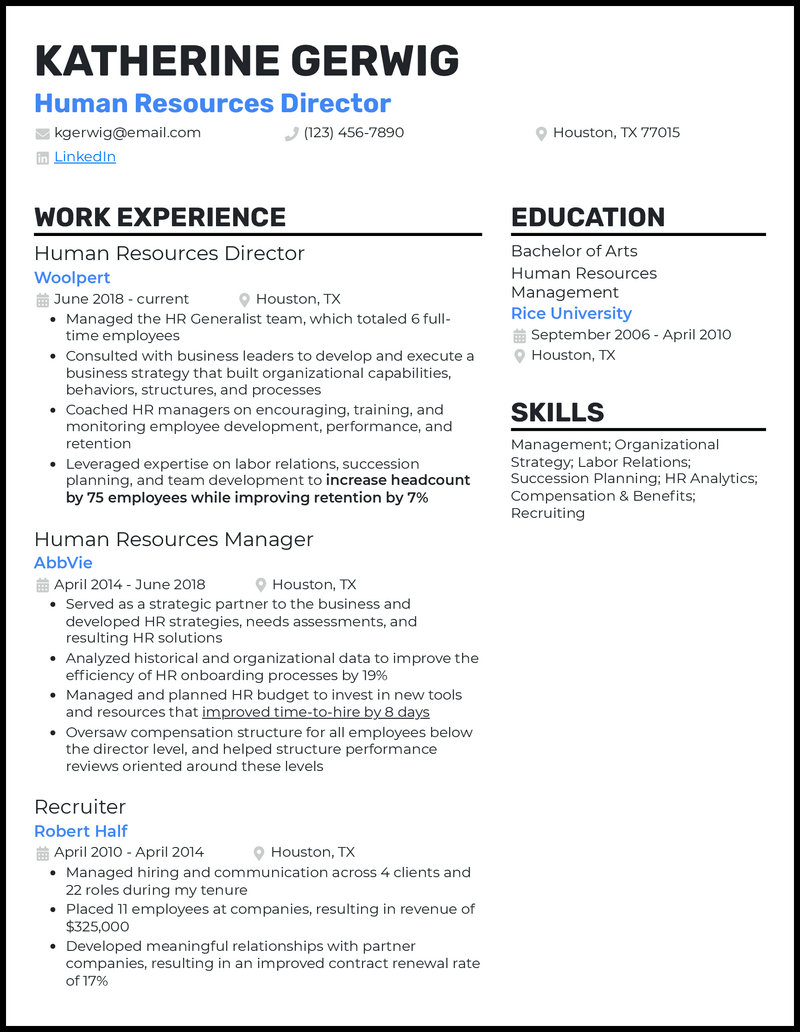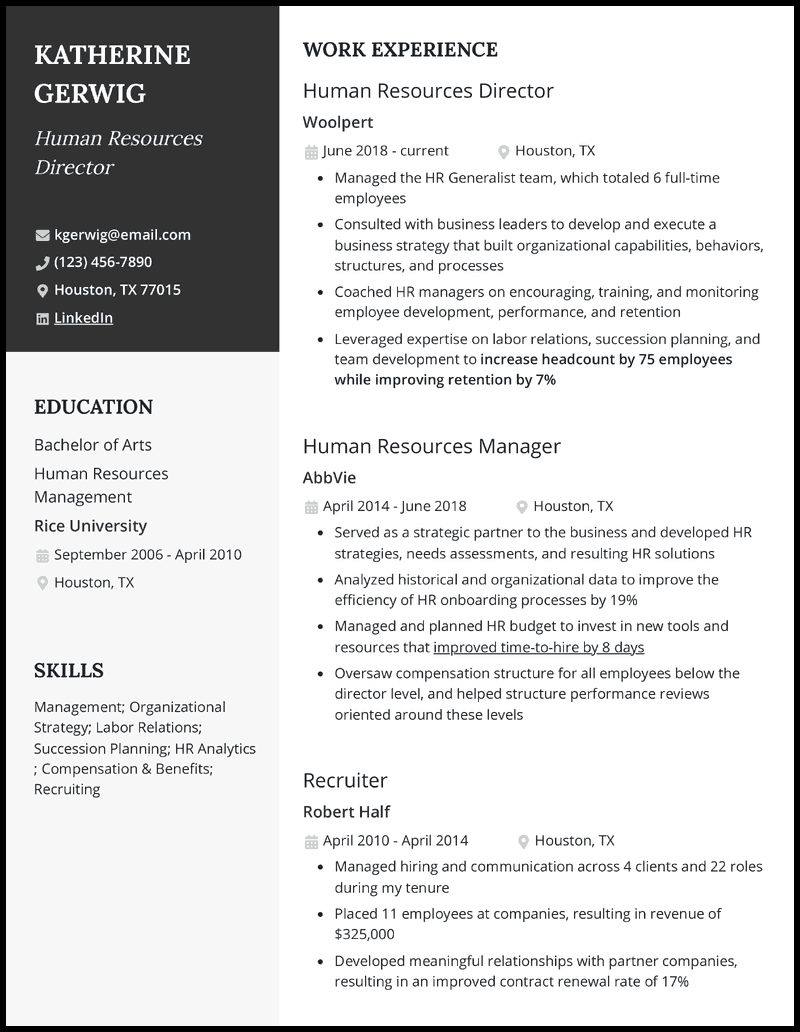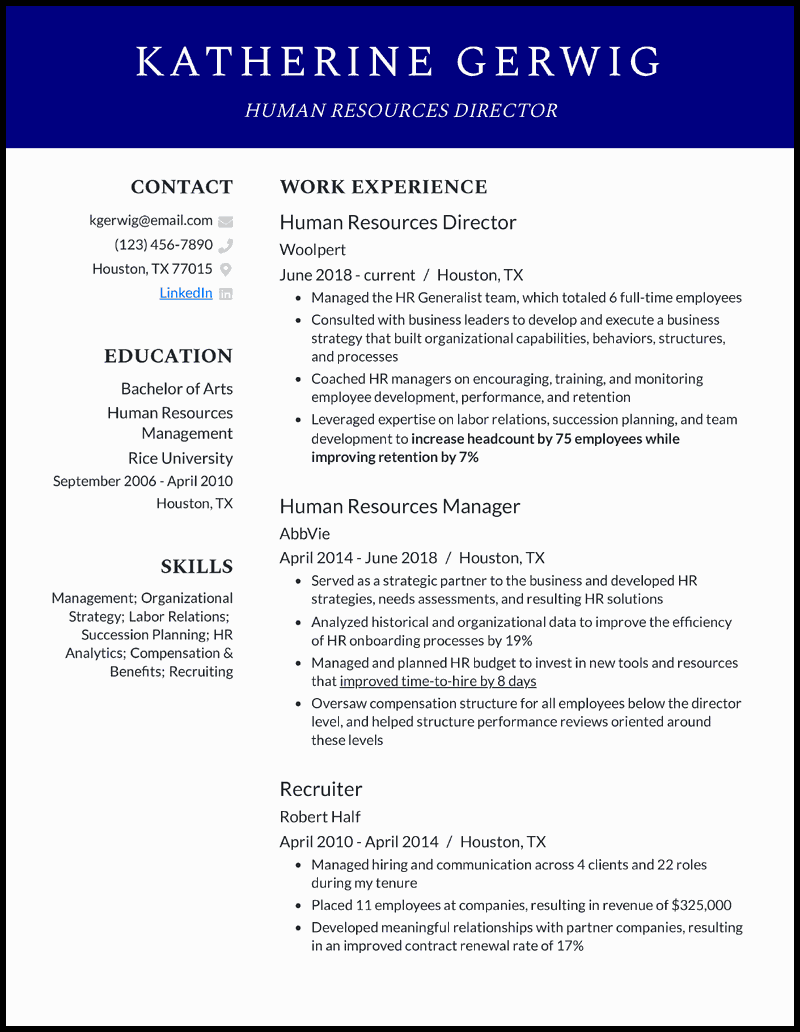You lead, plan, coordinate, and refine policies for your entire human resources department. In fact, you make the final executive decisions when it comes to new policy development and oversee their implementation.
So how do you pack all of that great stuff into your resume template?
Not to worry: We’ve helped folks like you land all kinds of jobs in HR, and we’ve got some handy resume tips to share with you. Use these three human resources director resume examples for inspiration.
Why this resume works
- Use your human resources director resume to show how you’ve climbed the ranks. Add important past roles such as HR manager or recruiter.
- Apart from giving your authenticity a quick boost, this is also a great way to mention your best achievements. Including quantified impacts like “improved time-to-hire by 8 days” or “grew retention rate by 7%” conveys that you’re not just an indispensable HR lead but an HR hero.
What Matters Most: Your Skills & Job Experience

You may have proven yourself with years of experience and career advancement, but you’ll still want to list your skills nicely. Recruiters want to see a well-rounded preview of your abilities so they can gauge how well you’d fit into the job role.
Since you’ve made it all the way to a director’s position, a lot of fundamental HR skills are implied: You don’t need to take up space mentioning basics like communication or teamwork; that’s a given.
Your skills should be more specific than that, anyway! Go beyond the subjective and generic and delve into keener skills that show your niche, like “recruiting” and “organizational strategy.”
Check these out:
9 most popular human resources (HR) director skills
- Organizational Strategy
- Analytical Thinking
- Labor Relations
- Succession Planning
- HR Analytics
- Compensation/Benefits
- Recruiting
- SumHR
- Zoho People
Sample human resources (HR) director work experience bullet points
Now’s the time to really let that career growth shine! Distill your experience down to the best: Put the highest points from your professional history in the reverse-chronological resume format to highlight how far you’ve come.
Recruiters want to see a solid trend of increasing complexity throughout your career. It’s essential to show that you’re well-rounded and diplomatic, so keep your soft skills in mind when outlining your resume.
Quantifiable metrics are also critical for your credibility: Can you measure how you increased onboarding efficiency? How much money did you save the company with strategic planning?
Here are some work experience bullet points to inspire you straight from our own resume samples:
- Developed meaningful relationships with partner companies, reaching an improved contract renewal rate of 17%
- Matched 11 employees with compatible companies, resulting in a revenue of $326,000+ dollars
- Analyzed historical and organizational data to improve the efficiency of HR onboarding processes by 19%
- Leveraged expertise in labor relations, succession planning, and team development to increase headcount by 76 employees and improve retention rate by 8%
- Managed and planned HR budget to invest in new tools and resources that improved time-to-hire by 8 days on average
Top 5 Tips for Your Human Resources (HR) Director Resume
- No objectives or summaries
- A human resources director resume should clearly display your career journey. In fact, it should display your advancement clearly enough that you don’t need to use extra page space to explain anything.
- The easier on the eyes, the better
- When you’re checking your resume, adding a little pop of color to show some personality and make it stand out is totally fine. Just make sure you don’t use color that clashes or makes your text hard to read—that would be a bit contradictory for a professional, organized HR director!
- Keep your experience points sleek
- We know: It can be really tricky to pack your experience and metrics down into a slim, easy-to-skim bullet point. But the better you do with this, the more likely the recruiter will be to read your resume! Then, whether you’re talking about retention strategies or employee training, just say what you did, state its impact, and then give a measurement for that impact.
- Show project ownership
- By this point, you should have plenty of memories from projects that you oversaw from start to finish. Share the time you led collaborative meetings that resulted in revenue-boosting strategies or the time you planned a resource budget that reduced weekly work hours.
- Answer the job description’s call
- Circle back to the original job description and ensure you’ve tailored your skill set and experience points to match it. Make sure you’re reflecting the right priorities in your resume. In other words, don’t spend all your time talking about using data to improve onboarding processes if the company’s more interested in reducing employee turnover.
How to Write a Human Resources Director Resume

- Present your HR experience in reverse-chronological order
As you’ve worked your way up to being an HR director, you’ve probably seen a lot of changes in the industry. More positions are filled virtually, and the top analytics software like Visier and OrangeHRM are always updated. You should list your most recent experiences first to emphasize your most relevant skills.
- Consider using a summary of your top HR achievements
HR director applicants often have many years of experience in the field, so a career summary of your best HR-related achievements will help you stand out. For instance, you could explain how your succession planning processes have helped boost retention rates by an average of 6% annually throughout your 12-year career.
- Optimize with top HR metrics
You know that many HR decisions are metrics-based. Therefore, including work experience bullet points with numbers is a great idea. Metrics like employee satisfaction, turnover, or acquisition costs will make your examples stand out.
- Limit it to one page of relevant HR skills
A one-page resume will make your top skills easily identifiable during a quick review process. To help, try focusing on the position’s primary needs. For instance, you could emphasize your employee retention and satisfaction strategies to stand out to an organization that needs help reducing turnover rates.
This might sound odd, but try to think of soft skills through a technical lens: Break interpersonal skills down into what you accomplished with them. Where does your communication branch off? Recruiting? Labor relations? Budget implementation?
A human resources director resume should almost always put the experience section in the spotlight. Your most vital selling points are probably your past accomplishments and all the positive impact you’ve made with them. On top of this, you’ll want a layout that’s sleek, professional, and well-organized, so pick the resume template that gives you and your experience the most shine.
If you’re struggling to keep your career story short enough for your one-page resume, then trim away a few choice points and use them in writing an effective cover letter, where you can spend a little more time diving into your career progression programs or your work with compliance laws. This way, you won’t have to part with any of your accomplishments.








